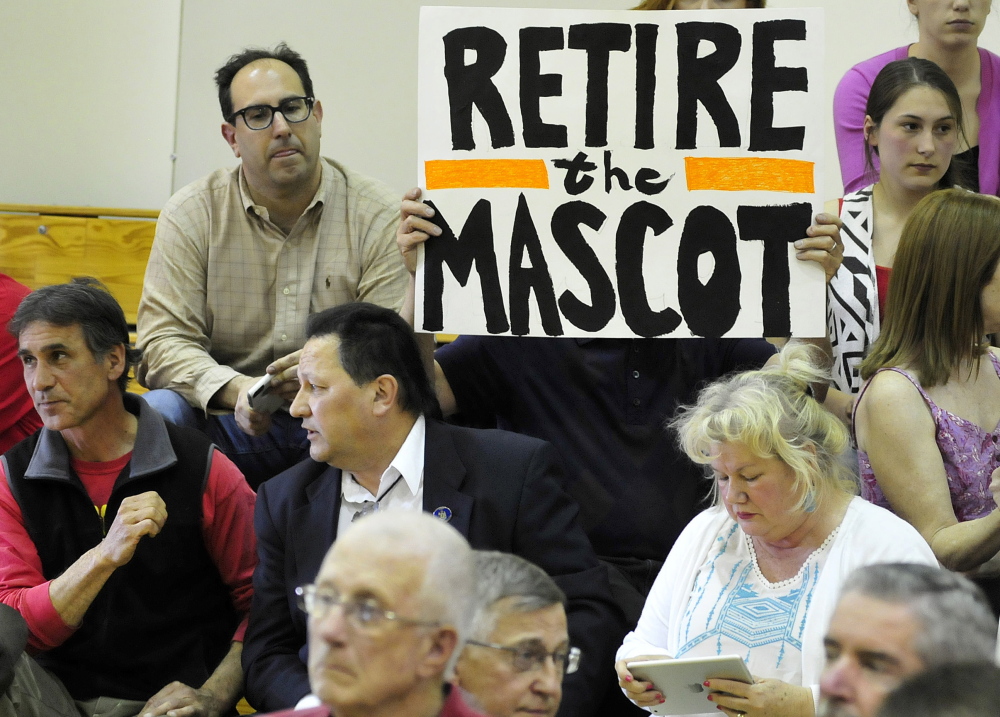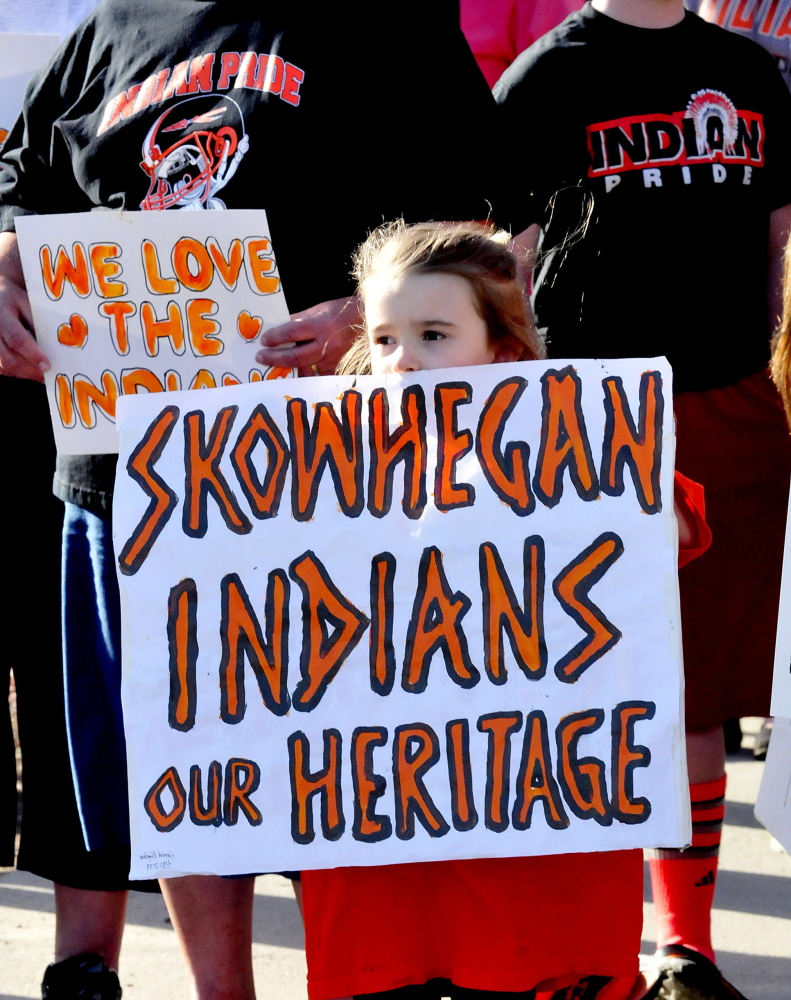SKOWHEGAN — Letters have been sent to the state education commissioner, the state Board of Education, the Skowhegan-based School Administrative District 54 school board and to the Maine Press Association.
The letters say the same thing: Please stop using the word “Indians” when referring to Skowhegan Area High School sports teams.
On June 16, a complaint was filed with the Maine Human Rights Commission by Maulian Smith, of the Penobscot tribe. The complaint alleges discrimination by the SAD 54 school board and the superintendent during a public meeting on the mascot issue.
The controversial question may have reached its apex in public last month when the school board voted to keep the Indians name, making Skowhegan the last high school in the state to have imagery that Maine’s Indians have asked to be removed. But behind the scenes the struggle is continuing as opponents of the mascot name seek different ways of pushing for change.
Doctors, lawyers, educators and business leaders have called on the school district to drop the name because they say it is offensive to the very people it is meant to honor – Maine Indian tribes.
Others in the community, including many members of the SAD 54 board, are holding fast to their belief that keeping the Indians mascot name is their heritage, their way of channeling the power and strength of the people who first settled on the banks of the Kennebec River, which runs through Skowhegan.
BOTH SIDES OF ISSUE DIG IN
Neither side is budging in a debate that has turned ugly in the past year, with insults, intimidation and charges of racism.
“As long as they continue, I will continue,” said Harold Bigelow, of Skowhegan, a vocal supporter of keeping the name who was elected to the school board June 9. “As long as they continue – that’s not a problem – that’s why I joined the school board.”
Bigelow said the school board vote in May to keep the name should be the final word on the matter.
“I think the town spoke and the vote was fair and I think it surprised a lot of people, but I had faith in it,” Bigelow said. “I believe that there is nothing they won’t try. I think that they have enough problems on the reservation and in their own lives. Why are they pursuing this? It’s not an issue as far as I’m concerned.”
American Indians in Maine, not all of whom live on a reservation, see it differently. So do many non-Indians who support them.
Members of Maine’s tribes say use of the name and related images is an insult to their heritage and an affront to the history of the region where tribal members were slaughtered and forced to move from their ancestral home so white Europeans could settle the land and enjoy the abundance it offered.
“While we understand that well-meaning folks truly believe they are honoring our people with these images, we do not feel honored and want their use to be discontinued,” Kirk Francis, chief of the Penobscot Nation, wrote in a letter to the SAD 54 school board.
Francis said “sports team mascots and other imagery … are offensive to and objectify Native people.”
In an 11-9 vote in May, the school board decided to keep the Indians mascot after public forums with the four tribes of the Wabanaki confederation and residents who support and oppose changing the name.
The rallying cry from Indians has been: “We are people. We are still here. We are not mascots.”
MEDIA OUTREACH BY EDUCATOR
Ed Rice, an author and adjunct instructor at the New England School of Communications and Husson University, sent a letter in May to members of the Maine Press Association asking newspapers and broadcasters across the state to stop using the Indians nickname when covering Skowhegan sports. Rice was behind the renewed effort in Skowhegan and has pushed for removal of similar Indian imagery at other schools in the state.
The press association declined to take a stance on the issue, saying it was beyond the scope of its mission, but said it would include Rice’s comments in a future newsletter for member media outlets.
“As the author of ‘Baseball’s First Indian,’ I’ve fought for years to see the Cleveland nickname and mascot ‘Chief Wahoo’ dropped because these do not honor Penobscot tribesman Louis Sockalexis,” Rice wrote to the press association. “I’ve been involved, since the symposium I helped to create in 2010 with the Maine Indian Tribal State Commission, to help eradicate these nicknames and mascots in my home state.”
Rice said the decision by some media outlets to stop using the name “Redskins” when referring to the NFL team from Washington, D.C., is a good start. Now, he said, he wants Maine media to stop using Indians as well.
Scott Monroe, managing editor of the Morning Sentinel and the Kennebec Journal, said the newspapers are “aware of the request” regarding the Indians name “and will certainly take it into careful consideration.”
The newspapers “do not have any official policy regarding use of the name ‘Redskins,’ but we did decide last year to avoid use of the name whenever possible in stories that refer to the Washington NFL team. Our thinking is that particular name is no different from any number of other ethnic slurs that are unsuitable for publication.”
NAACP CHAPTER BACKS NAME CHANGE
It’s been a year since Rice helped renew scrutiny on use of Indian imagery and names for sports mascots at Maine high schools.
Since that story published by the Morning Sentinel in May 2014, the focus has shifted to the last high school in the state to consider dropping Indian mascots – Skowhegan Area High School. There have been published reports of meetings, blog and social media entries, television reports and a statement from the Bangor office of the National Association for the Advancement of Colored People.
Michael Alpert, president of the Greater Bangor Area NAACP, said in February that his organization is dedicated to “universal civil rights and to the eradication of all forms of racism” – including use of the Indian mascot, which he called a symbol of racism. He said continued use of the Indian mascot degrades the community.
Alpert recently reaffirmed the Bangor chapter’s intentions, saying that his group supports the tribes and is disappointed in the SAD 54 school board vote.
“We would like to work with the tribes and the school board and the Skowhegan community to find a better resolution,” Alpert said. “I feel that it’s mistaken to have that kind of emblem for a school.”
Alpert noted that Skowhegan is near the site of one of the worst massacres of tribal people at Old Point, in what is now Madison, in 1724.
“That needs to be remembered,” he said.
Copy the Story Link
Send questions/comments to the editors.





Success. Please wait for the page to reload. If the page does not reload within 5 seconds, please refresh the page.
Enter your email and password to access comments.
Hi, to comment on stories you must . This profile is in addition to your subscription and website login.
Already have a commenting profile? .
Invalid username/password.
Please check your email to confirm and complete your registration.
Only subscribers are eligible to post comments. Please subscribe or login first for digital access. Here’s why.
Use the form below to reset your password. When you've submitted your account email, we will send an email with a reset code.